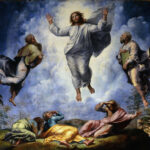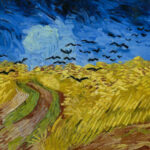Fourth Sunday of Easter – Year A

Today’s liturgy, as is often the case, develops two parallel themes: Jesus Christ expressing himself through a metaphor set in the world of sheep farming; Peter who takes center stage, both in the 1st and 2nd reading, as the guide of the Apostles and, as a consequence, of the Church.
I found myself wondering: given that talking about sheep and shepherds at the time of Jesus was an effective way to help the audience visualize ideas through familiar themes, does it still make sense for us, as we’re so far removed from the rural world? It’s become difficult to feel at home through these metaphors that reek of old.
I don’t have a definite answer, but images like these may represent a necessary anchoring to the past, to our roots. A reality check which can still play a role, especially in a future: only the man who doesn’t pooh-pooh the stench of a stable is saved. A man who doesn’t turn up his nose at meadows covered with those infamous black droppings. A man who’s not running away from the concrete, crude nature of a direct experience with the animal world.
This message, in this specific form, counters the temptation of a sort of technological cataharism, of craving for a singularity, a tech leap forward meant to change everything. Y’know, those who wish to become artificial, incorporeal minds themselves… and who cannot find value in accepting their essential animal nature.
Anyone who does not pursue a transformation, transcending the limits of our species, is saved, I said. But I mean he saves himself not so much in the sense of earning access to Heaven: rather, he avoids the risk of losing himself, in this life; he’s saved from the obliteration of the meaning of who we are and what our place in the world is.
We are sheep. And not always nice and cuddly beasts, on the contrary.
We are sheep even through our being stupid. We must acknowledge our limitations: we need a shepherd to follow. And if we don’t have one, we get lost. Maybe we’ll just try and follow a wolf, until he eats us.
Speaking of shepherds:
Jesus is the Good Shepherd, we all know that. Yet in today’s reading he says otherwise.
Jesus says “I am the gate for the sheep”. He provides this explanation to those who didn’t understand. We thought we understood him and yet he surprises us once again!
He’s not the shepherd, he is the gate.
Of course, metaphors can serve in different ways in different circumstances. The concept of the Good Shepherd is not invalidated.
But here the key to the reading becomes: in his coming at us, in recovering the lost sheep; in looking after and protecting us, in guiding us… there are multiple paths. Similar in one way or another; but they tend to pass through a delegated person.
Jesus is the Shepherd. But he’s also the Gate through which other shepherds pass: people who are tasked with representing him. As their duty.
The door is a necessarily static element.
Here again we find a recurring theme, difficult to accept for many Protestants, especially of a modern persuasion: the need for a mediation.
Jesus in our personal life is a unmovable element, motionless like a gate: I cannot expect him to appear to me, to perform a miracle for me personally, to have human interactions and to guide me visibly.
What comes to me from Jesus is a teaching, a goal, a story that goes to the heart, many things… but in a personal and intimate religiosity, Born Again Christian style, there’s no concrete person who comes to me, bends over my sins and sorrows, listens to me, admonishes me, puts me in physical contact with God in the Sacraments…
We desperately need shepherds, i.e. pastors: real men, that pass through Jesus Christ and nowhere else.
And we need Peter: those shepherds must be guided too.
We need a Peter who takes the floor and proclaims Christ, almost disappearing in the background.
In the First Reading he bears witness to Jesus starting from confronting the people of Israel for their own sin, since they crucified him, but then promising salvation through baptism (pattern: problem-solution; this path goes to Christ and passes through the gift of the Spirit and the Sacrament).
In the Second Reading he gives us Christ as the perfect model to follow, among other things in bearing the cross and turning the other cheek. And it’s just Jesus who saves us. He cannot be anything other than the center and the focus of the entire discourse: Christ and nothing else.
We don’t need, cannot stand, pastors according to their conscience, heralds of personal opinion.
If a priest speaks to us of solidarity, commitment, acceptance, courage, creativity, social justice, preserving nature, migrants, racism, diversity, inclusiveness… it’s extremely probable that he’s a bad priest; one who probably would have done less damage to become a city clerk instead, then marry a nail girl and raise a couple of unruly little rascals (with all due respect to nail technicians).










































